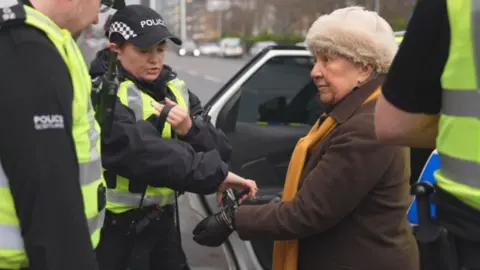Arrested anti-abortion protester 'willing to go to jail'
A woman who was arrested for taking part in an anti-abortion protest outside of the Queen Elizabeth University Hospital in Glasgow has said she is prepared to go to prison over the offence.
Rose Docherty, 74, became the first person to be arrested and charged under a new law which creates buffer zones outside Scottish abortion clinics in February.
She has rejected a formal warning from the Crown Office - arguing that it was "unjust" - and is waiting to find out what action may now be taken against her.
Doctors at the hospital have previously told BBC Scotland News that the protests, which have been held outside the hospital for nearly 10 years, were upsetting and intimidating for patients and staff.

The Abortion Services (Safe Access Zones) Act prevents any protests or vigils from taking place within 200m (650ft) of 30 clinics around the country.
Anyone who breaks the buffer zones law could be fined up to £10,000 or an unlimited amount in more serious cases.
Ms Docherty was arrested close to the Queen Elizabeth University Hospital (QEUH) on 19 February.
She had been holding a sign that said "Coercion is a crime, here to talk, only if you want".
In her first broadcast interview since the arrest, she said she had "no reason to regret" the incident.
She told BBC's Scotcast that the arrest was an "alarming" and "surreal" experience.
Ms Docherty added: "I don't feel I was breaking the law because I feel this law is an unjust law.
"I was just standing with a sign that was stating a fact that coercion is a crime.
"I was there to speak with people only if they wanted to speak with me. I wasn't approaching anyone, I wasn't behaving in a manner that was intimidating or harassing anyone."
Dr Greg Irwin, a doctor at the QEUH, was pictured confronting a group of protestors in February 2023, saying that they "cause emotional upset to patients, but also to staff members".
 PA Media
PA MediaHe added: "One in three women will make use of abortion healthcare, so judgemental protests at the hospital gates have a real and unpleasant effect, particularly on these staff members.
"But they also affect other staff, like myself, who find it infuriating to know that there are protesters outside the hospital intimidating patients on their way in.
"It's such an unbelievably cruel and unkind thing to do, and it bothers me throughout the protest period."
Extending buffer zones
The anti-abortion protests are often linked to the 40 Days for Life group - although Ms Docherty denied that she was a member of the US-based organisation.
Following her arrest, the Crown Office sent her a letter which contained a formal warning.
It said the procurator fiscal had decided against bringing Ms Docherty before a court and if she accepted the warning she would not be prosecuted.
"I said I wasn't accepting a warning because it's unjust," she said.
"I would be prepared to go to prison. I have no idea what might happen.
"I'm waiting to see what's going to develop from having written back to the procurator fiscal so it's up to them to see what their next step is."
The Abortion Services (Safe Access Zones) Act came into force last September.
It was drawn up by Scottish Green MSP Gillian Mackay, who said women seeking the procedure were subjected to "totally unacceptable abuse and obstruction" outside hospitals.
It is a criminal offence to behave in ways that could influence the decisions of women and staff to access services within the buffer zones.
Stopping women and staff from entering the clinics or otherwise causing alarm, harassment or distress is also an offence.
 PA Media
PA MediaGillian Mackay said patients and staff had told her that they still have to pass the protestors when attending the QEUH and "shared similar distress to what we heard during the passage of the bill".
She added: "I think it's appropriate that we take those concerns seriously and the government take a look at whether an extension is appropriate or not."
A Scottish government spokeswoman said the act allows ministers to extend the size of a buffer zone if it is decided that the existing zone is not adequate.
She added: "However, before taking such a step, it is essential that ministers are satisfied such an extension is appropriate.
"We have engaged with the relevant health board to understand any impacts the anti-abortion activity outside of the safe access zone may be having on patients and staff."
Moving location
Ms Docherty denied that she had deliberately sought to be arrested for publicity, despite it taking place just days after US Vice-President JD Vance highlighted the law as an example of free speech is Europe being "in retreat".
When asked about patients or staff feeling intimidated by the protestors, Ms Docherty said: "If they say they feel that way then they must feel that way, I'm not in charge of their feelings.
"But I know that my intention is not to do that, I'm standing peacefully and quietly."
She added: "We know that women have changed their minds because something has given them pause for thought.
"If someone is being influenced, it seems to point to the fact that their mind isn't made up."
She said that moving to another location further from the hospital would make the group less visible, meaning their "offer of help" was less visible.
"People say we should go to the Scottish parliament, but that's not where the help is needed," she added.
A spokesperson for the Crown Office and Procurator Fiscal Service said: "The procurator fiscal has received a report concerning a 74-year-old in relation to an alleged incident on 19/02/2025.
"The report remains under the consideration of the procurator fiscal."
